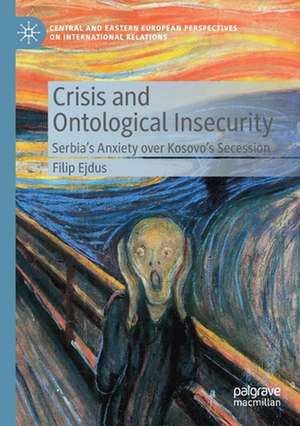Crisis and Ontological Insecurity: Serbia’s Anxiety over Kosovo's Secession: Central and Eastern European Perspectives on International Relations
Autor Filip Ejdusen Limba Engleză Paperback – 14 aug 2020
| Toate formatele și edițiile | Preț | Express |
|---|---|---|
| Paperback (1) | 522.89 lei 6-8 săpt. | |
| Springer International Publishing – 14 aug 2020 | 522.89 lei 6-8 săpt. | |
| Hardback (1) | 494.12 lei 3-5 săpt. | +19.43 lei 7-13 zile |
| Springer International Publishing – 11 iul 2019 | 494.12 lei 3-5 săpt. | +19.43 lei 7-13 zile |
Preț: 522.89 lei
Preț vechi: 615.16 lei
-15% Nou
Puncte Express: 784
Preț estimativ în valută:
100.05€ • 109.02$ • 84.31£
100.05€ • 109.02$ • 84.31£
Carte tipărită la comandă
Livrare economică 23 aprilie-07 mai
Preluare comenzi: 021 569.72.76
Specificații
ISBN-13: 9783030206697
ISBN-10: 3030206696
Pagini: 202
Ilustrații: XIV, 202 p. 1 illus.
Dimensiuni: 148 x 210 mm
Greutate: 0.29 kg
Ediția:1st ed. 2020
Editura: Springer International Publishing
Colecția Palgrave Macmillan
Seria Central and Eastern European Perspectives on International Relations
Locul publicării:Cham, Switzerland
ISBN-10: 3030206696
Pagini: 202
Ilustrații: XIV, 202 p. 1 illus.
Dimensiuni: 148 x 210 mm
Greutate: 0.29 kg
Ediția:1st ed. 2020
Editura: Springer International Publishing
Colecția Palgrave Macmillan
Seria Central and Eastern European Perspectives on International Relations
Locul publicării:Cham, Switzerland
Cuprins
1. Introduction.- 2. Crisis, Anxiety and Ontological Insecurity.- 3. The Construction of Kosovo as Serbia’s Ontic Space.- 4. Disintegration of Yugoslavia and Serbia’s Anxiety over Kosovo.- 5. Critical Situation: Kosovo’s Declaration of Independence.- 6. Dissonance and Avoidance: Serbia’s Quest for a New Normal.- 7. Conclusion.
Recenzii
“This book is essential reading for social scientists with a particular interest in Kosovo and Southeastern Europe, as well as for political scientists in international relations. It is also crucial for policy-makers … . Ejdus presents valuable insights into the Serbian politics of avoidance … . It is to be hoped that the book will also inspire international policy-makers to reflect more consciously upon their own politics of avoidance when it comes to the status of Kosovo.” (Pieter Troch, Comparative Southeast European Studies, Vol. 69 (2-3), 2021)
Notă biografică
Filip Ejdus is Associate Professor of Security Studies in the Faculty of Political Science at the University of Belgrade, Serbia.
Textul de pe ultima copertă
This book develops a novel way of thinking about crises in world politics. By building on ontological security theory, this work conceptualises critical situations as radical disjunctions that challenge the ability of collective agents to ‘go on’. These ontological crises bring into the realm of discursive consciousness four fundamental questions related to existence, finitude, relations and autobiography. In times of crisis, collective agents such as states are particularly attached to their ontic spaces, or spatial extensions of the self that cause collective identities to appear more firm and continuous. These theoretical arguments are illustrated in a case study looking at Serbia’s anxiety over the secession of Kosovo. The author argues that Serbia’s seemingly irrational and self-harming policy vis-à-vis Kosovo can be understood as a form of ontological self-help. It is a rational pursuit of biographical continuity and a healthy sense of self in the face of an ontological crisis triggered by the secession of a province that has been constructed as the ontic space of the Serbian nation since the late 19th century.
Filip Ejdus is Associate Professor of Security Studies in the Faculty of Political Science at the University of Belgrade, Serbia.
Caracteristici
Develops a novel perspective on crisis, identity and attachment to territory in world politics. Argues that Serbia's seemingly irrational foreign policy behaviour is a form of ontological self-help in the face of Kosovo's secession. Examines the relevance of materiality for ontological security of states.












